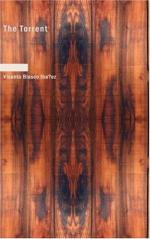And a regidor would be off to don Ramon’s like a greyhound; and arriving at the patio panting, out of breath, he would heave a sigh of relief and contentment at sight of “the chief” there, pacing up and down as usual, ready to get his friends out of their difficulties as if the limitless resources of Providence were at his command. “So-and-So said this-and-that!” Don Ramon would stop in his tracks, think a moment, and finally say, in an enigmatic oracular voice: “Very well, tell him to put this in his pipe and smoke it!” Whereupon the henchman, mouth agape, would rush back to the session like a racehorse. His companions would gather about him eager to know the reply that don Ramon’s wisdom had deigned to suggest; and a quarrel would start then, each one anxious to have the privilege of annihilating the enemy with the magic words—all talking at the same time like magpies suddenly set chattering by the dawn of a new light.
If the opposition held its ground, again stupefaction would come over them. Another mad dash in quest of a new consultation. Thus the sessions would go by, to the great delight of the barber Cupido—the sharpest and meanest tongue in the city—who, whenever the Council met, would observe to his early morning shaves:
“Holiday today: the usual race of councilors bare-back.”
When party exigencies forced don Ramon to be out of town, it was his wife, the energetic dona Bernarda, who attended to the consultations, issuing statements on party policy, as wise and apt as those of “the chief” himself.
This collaboration in the upbuilding and the up-holding of the family influence was the single bond of union between husband and wife. This cold woman, a complete stranger to tenderness, would flush with pleasure every time the chief approved her ideas. If only she were “boss” of “the Party!” ...Don Andres had often said as much himself!
This don Andres was her husband’s most intimate friend, one of those men who are born to be second everywhere and in everything. Loyal to the family to the point of sacrifice, he served, with the couple itself, to fill out the Holy Trinity of the Brull religion that was the faith of all the District. Where don Ramon could not go in person, don Andres would be present for him, as the chief’s alter ego. In the towns he was respected as the supreme vicar of that god whose throne was in the patio of the plantain trees; and people too shy to lay their supplications before the god himself, would seek out that jolly advocate,—a very approachable bachelor, who always had a smile on his tanned, wrinkled face, and a story under his stiff cigar-stained mustache.




